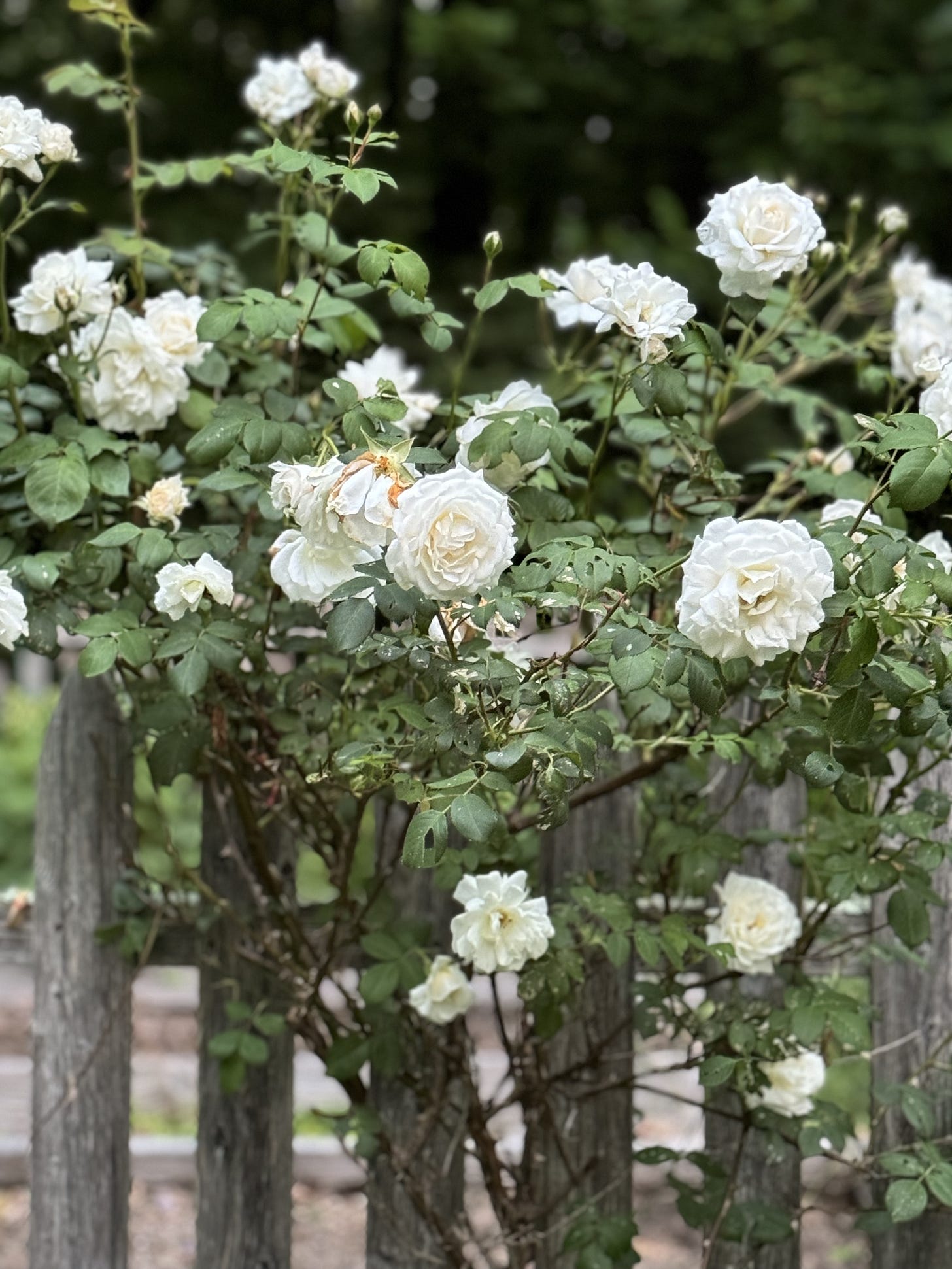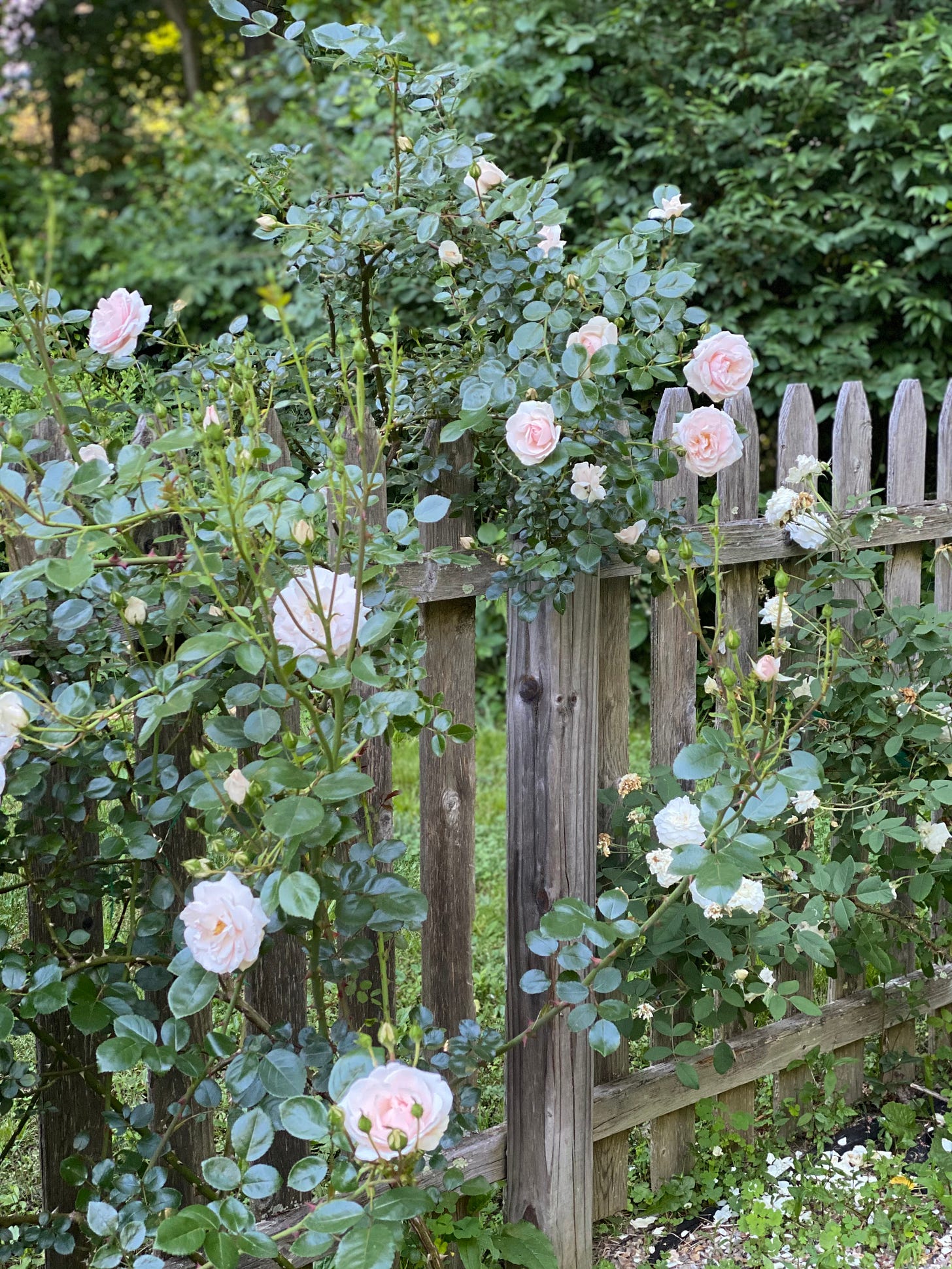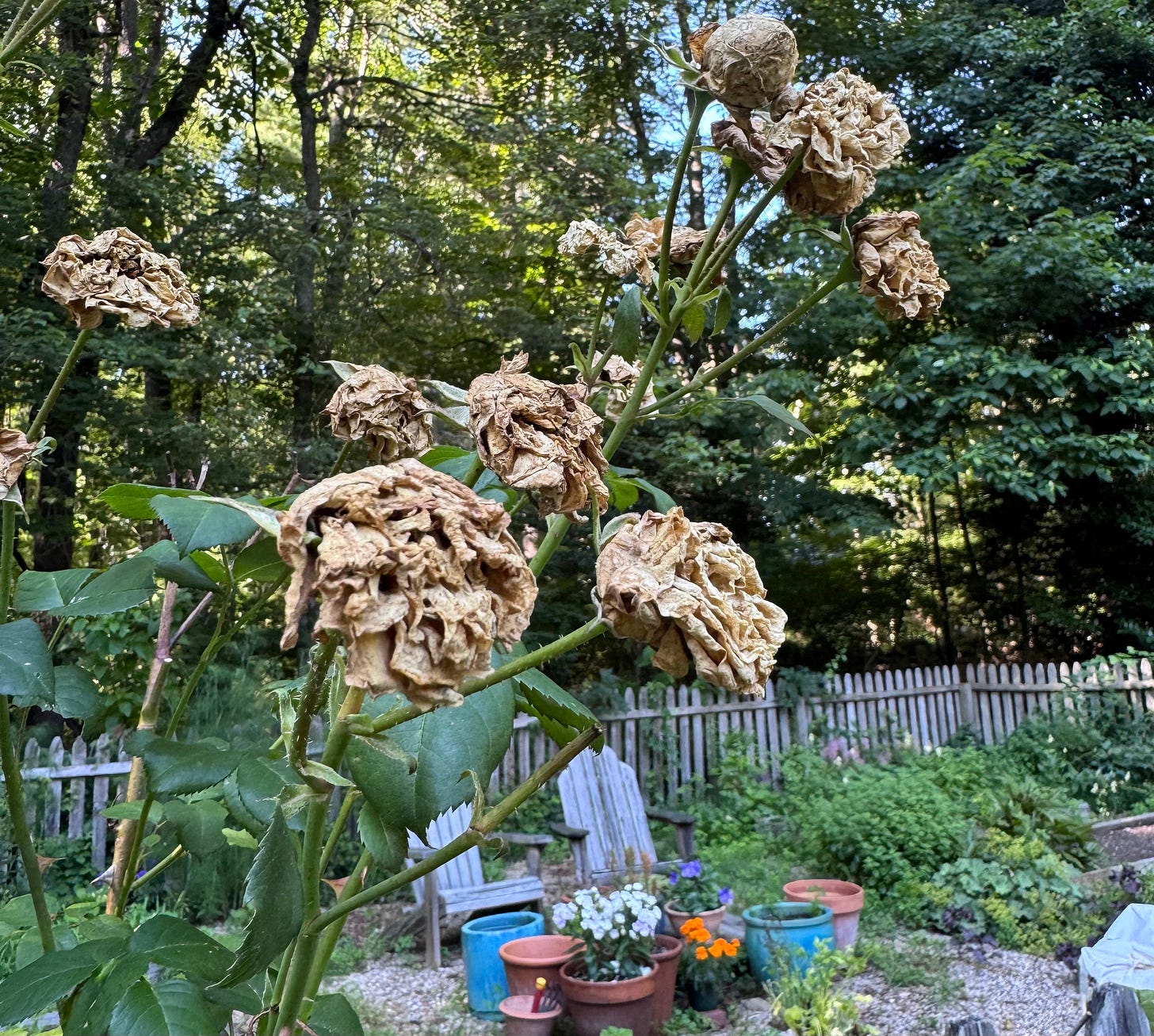...what happens if joy is not separate from pain? What if joy and pain are fundamentally tangled up with one another? Or even more to the point, what if joy is not only entangled with pain, or suffering, or sorrow, but is also what emerges from how we care for each other through those things? What if joy, instead of refuge or relief from heartbreak, is what effloresces from us as we help each other carry our heartbreaks? - Ross Gay, Inciting Joy
I read this morning that Joanna Macy is not doing well.
My heart plunged. I do not know how many of you are familiar with Joanna Macy’s work, but I came to it a long time ago, back in 2010 or so, when she appeared in conversation with
’s On Being. (And I will say this here, unashamedly: if you read my last essay, about Permission being the book I needed to both read and write, you will have also read that I went through a period a decade ago in which my own mortal coil frayed after a profound loss that I could have never predicted. One of the things that saved me — literally; they were like therapy sessions and a meeting with trusted friend and/or clergy all at the same time — was listening regularly to On Being, stepping into that community, and eventually contributing to it. To this day, I listen on repeat to conversations with very wise people who have become my dear friends (Katherine May, Anne Lamott), favorite poets (Jericho Brown, Naomi Shihab-Nye, and Mary Oliver), profound inspirations (Father Greg Boyle) and guides (Sylvia Boorstein and Sharon Salzberg, with whom I have done two silent retreats over the last decade), There are so many people I can include here who I discovered listening to the show, and one of them is Joanna Macy. Someone recently asked me what I wanted to be when I grew up and my answer was Joanna Macy: selflessly devoted to environmental causes at the psychological and spiritual level, Buddhist scholar, author of countless books on interdependence, co-translator with Anita Barrows of three books of Rilke poetry, an eternal student of the philosophy of deep ecology and interdependence. Joanna Macy was also a member of the CIA from 1952-54, and married to Francis Macy, who directed the Peace Corps from 1964-1972; there is, in that sentence, a great contradiction. It reminds me of the story of Krista working, after graduating from college, in East Germany for diplomats who spent their days shuffling around little plastic ICBMs on a map the way you would the pieces on a Monopoly board. Then she left and went to Yale Divinity School, which, I suppose, is the sort of thing that happens when you don’t believe in the murder of innocents.And I read this morning: at 96, Joanna is rejecting significant interventional care for what is likely pneumonia.
When I saw this news, I wanted to fling my phone across the room; everyone — so many people of great wisdom and thought, who have worked so hard to effect change in this world — seems to be leaving. Every time I read something about the Dalai Lama, my hands shake. My first response is inevitably NO! YOU CAN’T! WE NEED YOU NOW MORE THAN EVER! My next response is fear: what in the hell are we going to do without these voices, without this wise thought and counsel as we spin headlong into a time of breathtaking arrogance and profound state-sanctioned cruelty that seems to be invading us at both macro and micro levels (just yesterday, speaking with a Managed Medicaid “care manager” on behalf of my mother — who cannot walk, stand, leave her apartment, throw her trash out, dress, bathe, or visit her doctor unattended but had her aide hours cut by a New York City judge who made his decision without a complete set of supporting documents because the Managed Medicaid organization strategically didn’t send them to him — laughed at me when I expressed my distress. Laughed. At. Me.). My third response is visceral, flattening sorrow. My fourth, fury. My fifth, when I pull myself together, is gratitude for the like-minded among us, and recognition that for many, it is time to rest. And that, as Newton’s Third Law of Motion says, For every action there is a reaction. I may not be here to see the pendulum swing back in the direction of decency and humanity, but it will, eventually. I think. I have very small cousins in whose eyes I see hope and joy and incredible intelligence, and I think of them. How can it not swing back, in this world of beauty and art and music and love? Don’t we owe it to them?
This is what Ross Gay calls a fundamental tangle — a marriage of twisted, braided, oppositional experience that makes us who and what we are. I would like to think that this is not the human condition; I would like to think that the human condition is just all about the beauty and only the beauty. We skip down the happy path blithely and healthfully, unencumbered by poverty and sorrow, illness and war. Bombing aid workers doesn’t even figure in; cutting off funds that will save the lives of millions of children doesn’t even register. But this is not the case: sorrow and joy are attached at the hip, and we are fools to think otherwise. I’m not speaking here in Job-ian terms; I’m not speaking of endless doom, and knowing that there might be beauty just around the corner, tra-la. I’m speaking of knowing that these two things — the dark and the light; the beautiful and the ugly — inevitably live side by side and cannot possibly exist without each other.
Can we help each other carry our heartbreaks?
While I spent much of yesterday waiting for the Senate vote on America’s Horrific Bill — it will decimate and destroy the lives of absolute millions, of every stripe and background — it was also spent going back to Rilke’s words, from Letters to a Young Poet:
Perhaps all the dragons in our lives are princesses who are only waiting to see us act, just once, with beauty and courage.
A fundamental tangle.
This is the summer that my roses died.
When Susan and I left for England and Scotland at the end of May, my exuberant and explosive New Dawn climber, its canes as thick as a man’s thumb, was beginning to burst with blooms; it always blossoms before the other ones do. The white Eden rambler next to it — the one that blooms three times a year, the last time being in October before the first frost, like clockwork — already had a few bright white flowers, growing three to a cane. I fed, watered, and mulched everything before we left; I’ve been growning roses now for twenty-five years, and I am unaccountably good with them (for a girl who grew up in urban Queens), so I was confident that even if they looked a little troubled when we got home, they would ultimately be okay with love, water, food, and mulch.
And for a day or two, they were.
And then, they began to die. The Eden rambler went first, its cascade of white blooms going brown and crispy until the entire plant, down to about 2 feet from the soil, was sick. I pruned, I watered again, I mulched, I begged, I pleaded, and: nothing. A big, horticultural go-fuck-yourself, Elissa, as if this thing that had just recently been so stunning and vigorous was throwing a pie in my face, enraged that the planet is treated with such utter and complete disrespect, and Eden has decided that she just doesn’t want to be here anymore to witness the destruction.
Perhaps all the dragons in our lives are princesses who are only waiting to see us act, just once, with beauty and courage. - Rilke
Then, the always healthier of the two roses — the New Dawn — began to brown. Handfuls of buds, five or six at the end of each cane, stayed closed. I checked for aphids (none), and it was far too early for Japanese beetles.
The little heirloom rose next to the New Dawn didn’t even bother to produce a single bloom. It just died in place, where it stood.
I take my roses very seriously, and I always have, at least since I’ve lived in Connecticut. When I first moved here to live with Susan in 2001, one of the first things we did together was pay a visit to White Flower Farm, where we bought three Pierre de Ronsard climbers, which we planted along Susan’s front picket fence. The roses did incredibly well there, and by the time we moved out and down to northern Fairfield County, they were well-established and healthy. We considered asking the new owner to let us dig out the roses, but we didn’t because I didn’t want to move them; I was afraid the shock would kill them. I have no idea how they’ve survived, but every time we’re in that area, we drive past them to see how they’re doing, and, like most things, they’re older; the woman who bought the house is very kind, but I don’t think that roses are her jam. It hurts to see what’s left of them — to see that so much beauty has disintegrated. But, as my wise gardener friend Kate recently told me, it may just be their time.
After sending Kate close-up photos of what the roses look like now, devoid of my hyperbole, she diagnosed the problem: black spot, which my roses have never, ever had before. Black spot on a rose can kill it quickly, so she instructed me to remove the infected leaves and throw them out in a bag rather than compost them, and then prune back the rose — or what is left of it — by two-thirds, or almost to the ground. In the case of the New Dawn, this meant removing all of the canes that wrap around our garden fence, which run horizontally four feet in each direction. Heartbreaking. But yesterday morning, early, before it got too hot, I went out with my secateurs and began to remove the spotted leaves, dumping them into a large contractor bag until they were rid of infection; then I started to prune them back.
Beauty: gone. The hope of a lush, rose-scented August: gone.
Gardening is a contract with hope, as I once wrote in Motherland, and I kept mumbling this to myself as I pruned and pruned. Will they come back? I don’t know. I can only trust that they will, and if they don’t, I will have the memory of their beauty, and that may have to be enough.
As I write this, on Wednesday at noon, the truly terrible vote has gone the way that most of us in America knew it would. So many of us are clinging tightly to each other right now, and this is the key, isn’t it; this is where the joy resides, as Ross Gay says, entangled with pain and sorrow, but also emerging in how we care for each other through these things. Can we help each other carry our heartbreaks? We have to. Is the act of taking an established rose down to the ground to let it produce beautiful flowers again part of this plan? Is losing the wisest elders among us the thing that compels us to keep going, to keep doing the work in their names, but also the names of our children? I remember the story of Dorothy Day, who, as an eight-year-old child, witnessed the 1906 San Francisco earthquake and the response of its citizens, which was to help each other in the most profound ways. Why can’t humans always be this way, she wrote many years later. Why does it take such tragedy for us to be good to each other?
I listened to Joanna Macy again this morning, and she read from Rilke’s Go to the Limits of Your Longing, about pain and fear and the paralysis that touches us in the face of sorrow:
Let everything happen to you: beauty and terror. / Just keep going. No feeling is final.
A fundamental tangle; no feeling is final. Just keep going.
And we will. Weeping with grief over the death of decency and our democracy and our roses, breathless with anxiety, and unsure at every step. We will keep going.










Keep going. After all, what else can a caring human soul do?🙏🏼
Absolutely a heart breaking and angry time for me as well. While my husband and I have filled ourselves with dream building years where we felt we could pursue anything...what will remain for our children? I can only hope these times will bring people closer together when they realize how they were duped by the president and the 1%. It takes so much longer to build than to destroy, that is truth. Resist and do what you can. Protests, project mail storm are wonderful ways to release some of this frustration, anger and sorrow. As for the roses, I just made my first batch of wild rose jam. So surprisingly delightful. Ground yourself with cooking simple foods, the kitchen is my go to sanctuary.